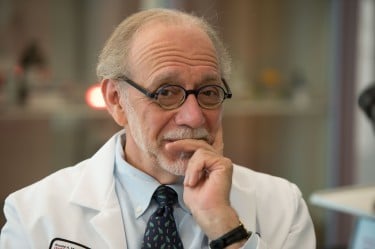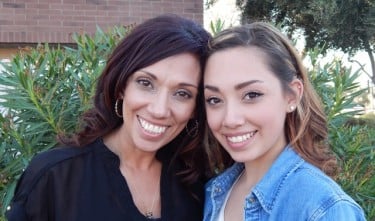By Janie Magruder
GCU News Bureau
A thief lives in the home of every child with cancer.
It steals play dates from the little girl too drained to go outside, favorite ice cream from the teenager too nauseous to keep it down and carefree days from siblings whose parents are barely surviving the cruel journey thrust on their family. It holds hostage happiness, promotes job loss, wrecks marriages and wipes out bank accounts.
All this, and yet the ultimate crime of cancer is even more unjust. At its worst, cancer robs a child of nearly 70 years of life.
“I think cancer is pretty lousy no matter what age you are,” said Dr. Robert Arceci, medical director of the Center for Cancer and Blood Disorders at Phoenix Children’s Hospital, a beneficiary of the March 8 GCU Foundation Run to Fight Children’s Cancer. “But children’s cancer is a horrible thing. The profound trauma and tragedy of cancer in the very young is that it reverses the age progression. It cuts people short.”
Childhood cancer must be caught earlier, treated better and, ultimately, eradicated, and the way to do that is to understand it. Arceci and other prominent oncologists are working to unlock the genetic code of cancer, using the most cutting-edge science available: molecular medicine. It employs genetic information to determine the right treatment for the right patient at the right time.
Under a broad umbrella of expertise and resources at PCH, the University of Arizona College of Medicine – Phoenix and the Translational Genomics Research Institute of Phoenix, the Ronald A. Matricaria Institute of Molecular Medicine was formed 15 months ago. The institute’s goal is to learn the structure and function of disease cells, beginning with cancer, and develop more targeted, less debilitating therapies for young patients. Early detection and cancer prevention could eventually result, but the work is laborious and complex.
“A cell has about 25,000 genes and many more parts of the genome that we don’t know what it does yet,” Arceci said.
The team’s first clinical trials involve children with acute myeloid leukemia (AML), a fast-spreading cancer in which bone marrow makes a large number of abnormal white blood cells. Survival rates are low among young AML patients who haven’t respond well to chemotherapy.
Over the next 18 months, as many as 60 scientists in the lab will collect and compare samples of AML tumors to healthy cells, and feed the data into a new hypothesis-generating computer module developed by the institute. The computer will make recommendations for better drugs.
“We have to get smarter,” Arceci said. “But the fact of the matter is that first patient you treat might respond, and you say, ‘Well, we’re pretty smart,’ and then the next four patients won’t respond, even though they have the same mutation.”
The institute has received grants from various organizations, including $100,000 over four years from Children’s Cancer Network (CCN), formed 10 years ago by Steve and Patti Luttrell of Tempe to assist Arizona families battling childhood cancer. The Luttrells’ son, Jeff, was diagnosed more than 20 years ago with leukemia and has since undergone numerous rounds of chemotherapy and radiation and multiple surgeries. Jeff also has survived two recurrences of a secondary cancer. Patti Luttrell is an adjunct faculty member in GCU’s College of Nursing and Health Care Professions.
“In so many of the kids who go through this, including Jeff, the level of toxicity in the drugs is severe and the late effects can be profound. If the institute’s research can impact that toxicity, these kids will be so much better off 10, 15, 20 years down the road,” Steve Luttrell said. “At the same time, the level of financial, educational and psychosocial services that CCN provides to our families will not change with this contribution.”
Most young AML patients get the same cancer treatment, Arceci said.
“A majority of them will go into remission. A bunch won’t. And we don’t know which ones will and which ones won’t,” he said. “All of them get the same toxicity, which is profound. They may spend a month in the hospital, and a large number go to the intensive care unit. For every 100 children, one to three will die just from our treatment.”
Jazmine “Jazzy” Ramos, 17, a junior at Mountain Ridge High School in Glendale, got three commonly prescribed drugs during her chemotherapy treatment for osteosarcoma, an aggressive bone cancer, in her left shinbone. Diagnosed in the sixth grade, Ramos had surgery and underwent nearly 10 months of treatment, losing her hair, two semesters of school and, doctors say, the ability to conceive.
Ramos’ cancer relapsed two years ago, when tumors were found in her right lung. Doctors are monitoring nodules that have developed there. After years of physical therapy, Ramos walks normally but wears a brace from her left foot to her knee, and likely has more surgeries to endure.
The Phoenix teen has an unwavering faith in God and, through speaking engagements and fundraisers for the Purple Society and HopeKids, has become a source of encouragement to children.
“People ask me, ‘What if your cancer comes back or you get another cancer?’” Ramos said. “If God’s taken me this far, He’s going to stand by me the rest of the way.”
Her mother, Bernadette Kesler, imagines what molecular medicine could mean for the next generation of cancer victims.
“If cancer could be detected before it’s aggressive or even before stage one, if children no longer had to endure bone marrow transplants and horrible chemotherapy, wow, what an amazing thing,” she said.
Contact Janie Magruder at 639.8018 or [email protected].





































































